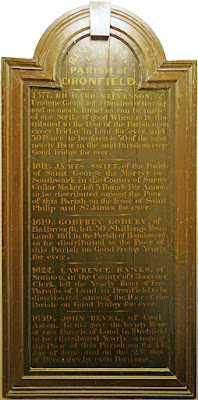Bequests to the Parish of Dronfield
The names of some of those who, in the past, left money to the poor of Dronfield parish can be seen on a large, wooden display board at present in the Old School in Dore. The parish was divided into four and Dore was one of the quarters. The church warden of Dore had the task of selecting the poorest parishioners and distributing to them the quarter share of the gifts in accordance with the stipulations in a will or indenture.
"1577. RICHARD STEVENSON, of Unstone, Gentn left a Hundred of Herrings and as much Bread as can be made of one Strike of good Wheat, to be distributed to the Poor of the Parish upon every Friday in Lent for ever, and 30 Pence to be given to 30 of the most needy Poor in the said Parish on every Good Friday for ever."
In Richard's will he actually left 'half a hundred' of good herrings. The wheat used to make the bread was measured in a circular wooden drum with the capacity of a bushel. A stick (a strike) was used to level off the top of the wheat ensuring it was the correct quantity. On the seven Fridays in Lent the poor of each quarter received the herrings and bread in rotation– 1st and 5th Unstone and Coal Aston, 2nd and 6th Dronfield, 3rd Dore and Totley and 4th Holmesfield and on the 7th the hamlet of Barlow - who only had five or six poor families.
Richard also left 30 pence to 30 poor people in each of the parishes of Dronfield, Chesterfield, Eckington and Sheffield.
Conditions
Richard's will made it clear that, although his sons Edmund and Christopher would inherit his tanyard, leather and farms, they would not inherit a house and land at Brampton unless his wishes to provide for the poor were carried out.
This wasn't the only condition placed on Christopher and Edmund in the will. They were also to provide their uncle John Stevenson, who was a clergyman, with meat and drink for as long, and as often, as he came to stay in Richard's mansion house:
"....I will devise and bequeathe that my said brother shall at all and ev[er]y tyme and tymes when and as often as he shall come and repayre to my Mansion House wherein I now dwell have sufficient and convenient meate Drincke and Lodginge mete and convenient for his estate and degree by and duringe all the tyme of his abode and tarryinge there and that to be from tyme to tyme borne......."
Edmund's Bequest
The 1827 Charity Commissioners' report for Dronfield states that Edmund, who died in 1593, left 33 shillings and 4 pence in his will to be given annually to the poor at Easter and Christmas. The total sum, willed by Richard and Edmund, was still the same in 1827. Dronfield parish received 2s.6d. on Good Friday and 16s.8d. at Christmas and at Easter.
The Mill Farm Tenant
By 1827 the three fields of Mill Farm which provided the income for the bequests - Harvest Bank, Bentleys and Hooper Bank were in the ownership of A Brooks, Esquire and R N Shaw, Esquire. Out of the income from the three fields the tenant, John Walker, provided the herrings and bread to the vestry as laid down in Richard's will and delivered the money to the vestry. He also had to pay for the bread-making. The vicar and church wardens distributed herrings and bread to the poorest. The money was distributed to the poor who attended church on Good Friday and at Easter and Christmas.
